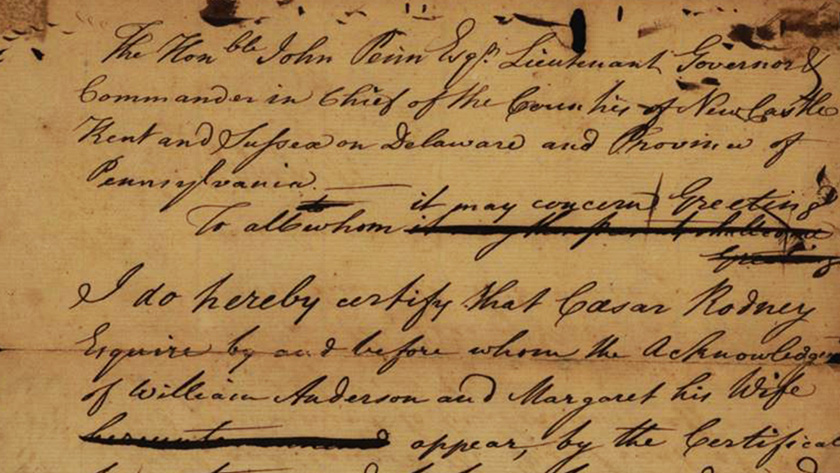
Delaware Historical Figures: Caesar Rodney
By David Cardillo, Digital Initiatives and Preservation
Within the Delaware Miscellaneous Literary and Historical Manuscripts collection, there are several letters written by or to the famed Delawarean Caesar Rodney, who was also a signer of the Declaration of Independence.
During his career, Rodney served as the was once Supreme Court Justice of Colonial Delaware. Lieutenant Governor John Penn of Colonial Pennsylvania penned a letter certifying him as the Supreme Court Justice for New Castle, Kent and Sussex counties in Colonial Delaware.
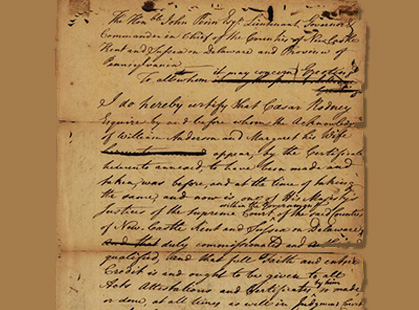
Letter from Lieutenant Governor John Penn of Colonial Pennsylvania to Caesar Rodney, appointing him as a Supreme Court Justice in Colonial Delaware. The exact date of this letter is unknown, but it was written in the mid to late 1700s.
During the Revolutionary War, Caesar Rodney served as the President of Colonial Delaware from 1778 to 1781. It was during this time that Thomas McKean and John Dickinson, two other notable Delawareans, reached out to him for assistance. A British ship had been captured in Annapolis, Maryland, and at the request of the Continental Congress, McKean and Dickinson wrote to Rodney, seeking his help in detaining and guarding the 64 prisoners from the British ship.
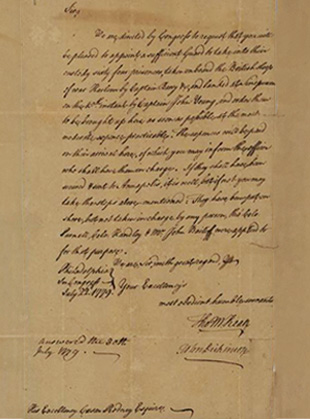
Letter from John Dickinson and Thomas McKean to Caesar Rodney requesting assistance in guarding 64 British prisoners from a captured ship, dated July 22, 1779.
Following his term as President/Governor of Delaware, Rodney, along with his brother Colonel Thomas Rodney, served as Delaware’s Representative to the Continental Congress. During this period, Caesar Rodney fell ill and wrote to his brother Thomas, essentially requesting transportation back to Delaware, at least to Dover if not Wilmington.
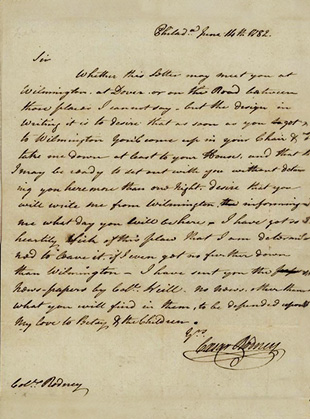
Letter from Caesar Rodney to his brother, Colonel Thomas Rodney, requesting a ride to Delaware, dated June 14, 1782.
It is unfortunate that there are not enough letters in this collection to ascertain the closeness of Caesar’s relationship with his brother, Thomas, through regular correspondence. However, in this collection, there are two letters. Apart from the letter mentioned above, there is also an earlier letter from Caesar to Thomas, predating the Revolutionary War. Caesar was part of the Delaware delegation to the Stamp Act Congress in New York and wrote to his brother to inform him that the congress in New York would not concludebefore the end of the Delaware Assembly session, in which Caesar was also involved.
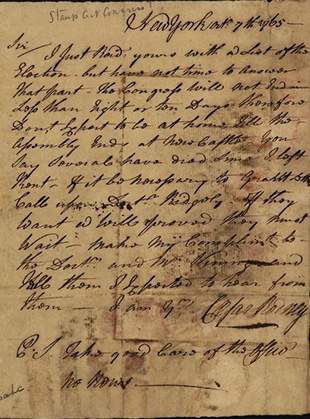
Letter from Caesar Rodney to his brother Thomas, explaining his inability to return to Delaware before the end of the session of the Delaware Assembly due to the Stamp Act Congress he was attending in New York dated October 7, 1765.
Based on the letter, it appears that Caesar was requesting Thomas to convey his apologies to the assembly, and any bills requiring his approval would need to be postponed until the next session.
These correspondences between Caesar Rodney and his brother paint a portrait of a man deeply involved in public affairs, who had a national perspective but also took action at the local level. He was just one of many Colonial Americans who played a significant part in shaping the country (and state) in which we now live.
